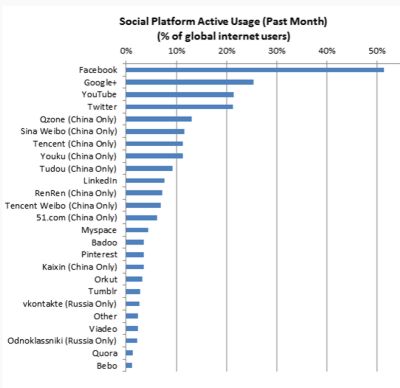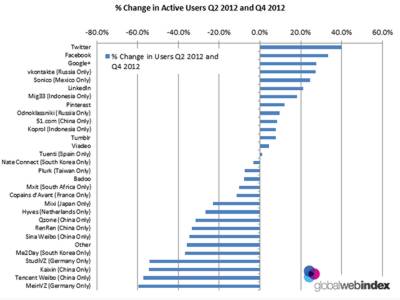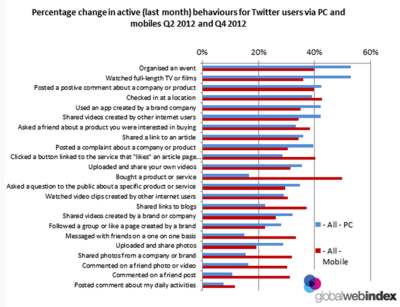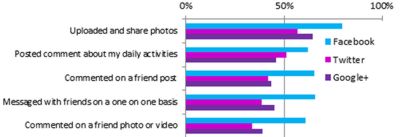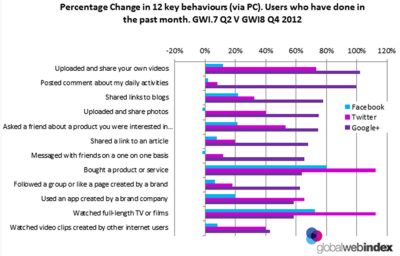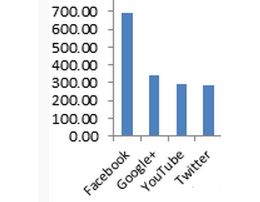| Social Media Trends - Google+ Is Number Two |
| Written by Lucy Black | |||
| Tuesday, 05 February 2013 | |||
|
Facebook is used by 51% of global Internet users, Google + is rapidly closing the gap, but it is Twitter that saw the greatest percentage increase in users during 2012. How do these trends fit together? Date collected across Trendstream's 31 markets (approximately 90% of global internet population) for its GlobalWebIndex show that in December 2012 over half of global internet users can be considered "Active Users of Facebook" - by which it means "Used or contributed to in the past month". By comparison Google+ is actively used by 25% and Twitter by 21%, the same proportion as YouTube.
(click in chart to enlarge)
The statistics also reveal continuation of a trend previously noted by Trendstream: a shift from localized to global social platforms: The growth in the large, global social platforms is coming broadly at the expense of local services like MeinVz, Hyves, Copains d’Avant. Even more interestingly, we are seeing a large decline across the board in local Chinese services with Tencent Weibo, Kaixin, Sina Weibo and QZone all declining substantially, up to 57% in the case of Tencent Weibo.
(click in chart to enlarge)
Looking at the above chart showing change between GWI's Q4 survey and the previous one (Q2 2012) it is Twitter that comes out top with 21% more active users. Further analysis of Twitters users', both desktop and mobile, change in activities is shown below - click in chart to enlarge it:
Looking at the predominant activities across the top three social platforms revealed consistent patterns with sharing photos, posting personal news, commenting and messaging being the top behaviors.
In a blog post that looked specifically at Google +, the survey results showed explosive growth in the used of Google platform for video sharing and posting comments. Moreover when it comes to uploading photos the increase between Q2 and Q4 for Google+ was 75% while there was a 2% decrease for Facebook:
Noting a 140% expansion for Google+ in South Korea between Q2 and Q4 Trendstream comments: One reason Google+ has grown so quickly and also a reason why many commentators have overlooked it is that growth has been driven largely by markets outside of the US and Western Europe. The internet today is far more global than when Facebook or Twitter emerged. Furthermore, Google’s existing global reach with core search products (83% of global internet user’s visit on a monthly basis) and the rapid rise of Android on a global scale (54% of mobile phones used) mean that Google has instant global reach to build Google+ usage. Trendstream concludes: The social media landscape is becoming an oligopoly with the big 3 (Facebook, Google and Twitter) dominating on a global scale due to their level of integration throughout the web. This is a fundamental reason why Google+ has been so quick to grow. It links together and increasingly enhances all of Google’s other products from Android to Gmail to Search in a way that builds a complete digital experience for the user and works as a social layer, not just a network.
If you have been thinking of Google+ as a late to the party failure or a ghost town you need to think again. There is also a lot of anecdotal evidence that Google+ users are interested in more serious topics and are predominantly techie. Google is also using its many successful services to make Google+ seem an obvious companion. For example, if you use Picassa to manage photos then it is very natural to upload photos and create albums for Google+. Another factor is that Google+ seems to be well written and is fast with few bugs or unexpected behaviors and with lots of additional features. By comparison Facebook seems to be a bit of a mess - you can almost hear the code creaking. Could it be that a well-engineered site has the edge? More InformationRelated ArticlesGoogle+ an API to get you started?
To be informed about new articles on I Programmer, install the I Programmer Toolbar, subscribe to the RSS feed, follow us on, Twitter, Facebook, Google+ or Linkedin, or sign up for our weekly newsletter.
Comments
or email your comment to: comments@i-programmer.info
|
|||
| Last Updated ( Friday, 29 November 2013 ) |
